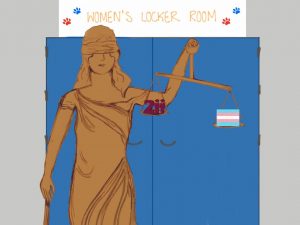Equal locker room access for transgender students should be D211 policy
 Mauli Patel
Mauli Patel The Crier believes that D211 should grant transgender students unlimited access to the bathrooms and locker rooms that match their gender identity.
When you type “transgender locker room access” into a Google search, the first two pages are filled with articles about D211’s handling of locker room access for transgender students. Almost three years after anonymous transgender student Student A and the American Civil Liberties Union (ACLU) sued D211 for unrestricted locker room access, D211’s position continues to receive notice.
Recently, tensions rose even higher with two opposing lawsuits, one demanding unrestricted locker room access and one demanding no access at all. With multiple major media outlets shining light on how D211 approaches locker room access for transgender students, the controversy of whether it protects the civil rights of all students equally has drawn national attention.
The Crier believes that D211’s approach to locker room access discriminates against transgender students, who deserve unlimited access to their gender-identified locker rooms. As more Americans identify as a part of the LGBTQ community, and social politics become more liberal, D211’s position will place us on the wrong side of history.
Much of the controversy associated with granting transgender students full access to locker rooms stems from a lack of understanding of what it means to be transgender. Gender is not merely anatomy but is defined by how one thinks, feels, and identifies. Many transgender students undergo draining hormone treatments during their transition. At the same time, many students face harsh judgement from peers and sometimes even family members. Students who undergo the transitioning process have to fight through social judgements, all while trying to figure out who they are. Thus, the transition is by no means easy.
Even the process of requesting access to locker rooms is one that requires courage, as students need to explain their situation–one that could be uncomfortable for them to talk about–to multiple teachers and administrators. However, under the current D211 approach, after all that effort, the student will at best receive restricted access, equating to restricted rights.
D211 asserts a position that they deem a compromise between people who want unrestricted transgender locker room access and people who want no locker room access for transgender students. It dictates that if a transgender student is approved, they will have to make a commitment to utilize a changing area. After having to struggle personally and publicly to undergo the transitioning process and request rightful locker room access, students are forced to use a segregated area if they are approved, which makes D211’s position yet another obstacle in the path of the already difficult fight for transgender rights.
People who support the D211 compromise or do not want transgender locker room access may not fully understand the struggle transgender students face. Unfortunately, people often mistakenly believe that transgender students are boys who want to ogle at girls while they change (or vice versa). This belief is rooted in fear.
Because few districts across the nation allow unlimited locker room access, few studies exist on transgender students in locker rooms. However, Media Matters, a non-profit progressive research center, conducted a meta analysis of districts that do allow unrestricted access. Their study concluded that such fear is factually unfounded.
The study looked at 17 school districts, which include over 600,000 students across the country, that provide unfettered bathroom and locker room access to transgender students. It shows there have been no reported problems with voyeurism or sexual harassment.
Some students may feel uncomfortable changing next to a transgender student, and those students, of course, have the option of changing in a different row of the locker room. However, disallowing transgender students from changing in their gender-identified bathrooms because of other students’ potential discomfort is unjustified.
Furthermore, the approach D211 takes regarding locker room access isn’t an appropriate reflection of the community culture found in D211 schools. Conant, specifically, is a diverse community of students and teachers. Students of differing races, religions, and sexualities come together here and embrace their differences. Clubs such Cultural Awareness and Sexuality and Gender Alliance (SAGA) celebrate the individuality of our student body. Conant and other D211 schools embody an environment of acceptance; however, their approach regarding transgender locker room access reflects the opposite.
 Futo Wada
Futo Wada Many other schools across the country have already made the transition to a more progressive policy. While these school districts step forward, D211 stays stagnant. It’s time for D211 to progress with the changing times and uphold the civil liberties of transgender students.
During the Jim Crow Era, people felt uncomfortable sharing a bathroom with people of color, but with more understanding came more acceptance. In the same way, greater understanding will reduce the stigma surrounding being transgender. Allowing transgender students unrestricted access to locker rooms will help reduce the stigma surrounding transgender youth, which is why it is imperative that D211 adopt a more progressive policy sooner rather than later.
Editor’s Note: This article originally used phrasing to suggest that D211 has a set policy on access to locker rooms for transgender students. D211 does not have a policy; instead, it treats each request on a case-by-case basis.




This opens a different perspective for everyone and hopefully, the number of people who understand will grow.
Also, i agree: With more understanding, comes more acceptance
Do “we” the students have any say in this? Regardless of who they are, technically they are still male/female.
Plus these people will get harassed/bullied.